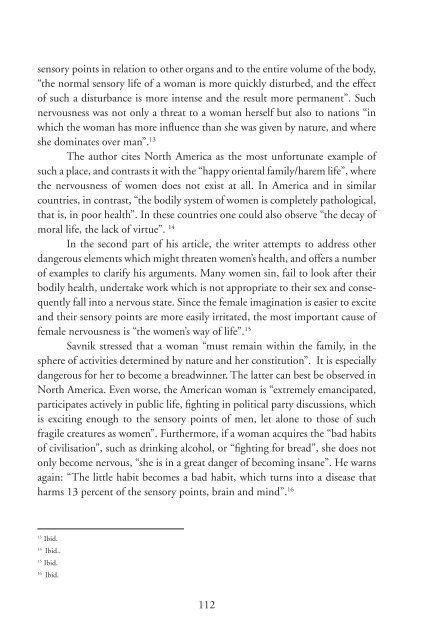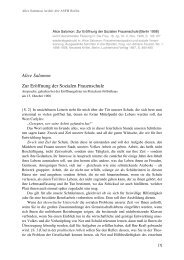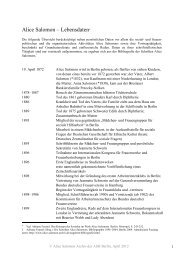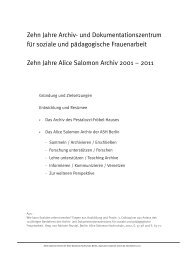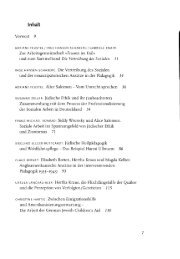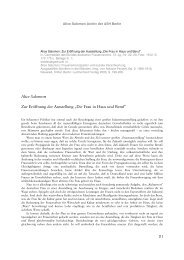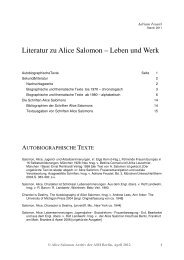Teaching Gender in Social Work - MailChimp
Teaching Gender in Social Work - MailChimp
Teaching Gender in Social Work - MailChimp
You also want an ePaper? Increase the reach of your titles
YUMPU automatically turns print PDFs into web optimized ePapers that Google loves.
sensory po<strong>in</strong>ts <strong>in</strong> relation to other organs and to the entire volume of the body,<br />
“the normal sensory life of a woman is more quickly disturbed, and the effect<br />
of such a disturbance is more <strong>in</strong>tense and the result more permanent”. Such<br />
nervousness was not only a threat to a woman herself but also to nations “<strong>in</strong><br />
which the woman has more <strong>in</strong>fluence than she was given by nature, and where<br />
she dom<strong>in</strong>ates over man”. 13<br />
The author cites North America as the most unfortunate example of<br />
such a place, and contrasts it with the “happy oriental family/harem life”, where<br />
the nervousness of women does not exist at all. In America and <strong>in</strong> similar<br />
countries, <strong>in</strong> contrast, “the bodily system of women is completely pathological,<br />
that is, <strong>in</strong> poor health”. In these countries one could also observe “the decay of<br />
moral life, the lack of virtue”. 14<br />
In the second part of his article, the writer attempts to address other<br />
dangerous elements which might threaten women’s health, and offers a number<br />
of examples to clarify his arguments. Many women s<strong>in</strong>, fail to look after their<br />
bodily health, undertake work which is not appropriate to their sex and consequently<br />
fall <strong>in</strong>to a nervous state. S<strong>in</strong>ce the female imag<strong>in</strong>ation is easier to excite<br />
and their sensory po<strong>in</strong>ts are more easily irritated, the most important cause of<br />
female nervousness is “the women’s way of life”. 15<br />
Savnik stressed that a woman “must rema<strong>in</strong> with<strong>in</strong> the family, <strong>in</strong> the<br />
sphere of activities determ<strong>in</strong>ed by nature and her constitution”. It is especially<br />
dangerous for her to become a breadw<strong>in</strong>ner. The latter can best be observed <strong>in</strong><br />
North America. Even worse, the American woman is “extremely emancipated,<br />
participates actively <strong>in</strong> public life, fight<strong>in</strong>g <strong>in</strong> political party discussions, which<br />
is excit<strong>in</strong>g enough to the sensory po<strong>in</strong>ts of men, let alone to those of such<br />
fragile creatures as women”. Furthermore, if a woman acquires the “bad habits<br />
of civilisation”, such as dr<strong>in</strong>k<strong>in</strong>g alcohol, or “fight<strong>in</strong>g for bread”, she does not<br />
only become nervous, “she is <strong>in</strong> a great danger of becom<strong>in</strong>g <strong>in</strong>sane”. He warns<br />
aga<strong>in</strong>: “The little habit becomes a bad habit, which turns <strong>in</strong>to a disease that<br />
harms 13 percent of the sensory po<strong>in</strong>ts, bra<strong>in</strong> and m<strong>in</strong>d”. 16<br />
13<br />
Ibid.<br />
14<br />
Ibid..<br />
15<br />
Ibid.<br />
16<br />
Ibid.<br />
112


